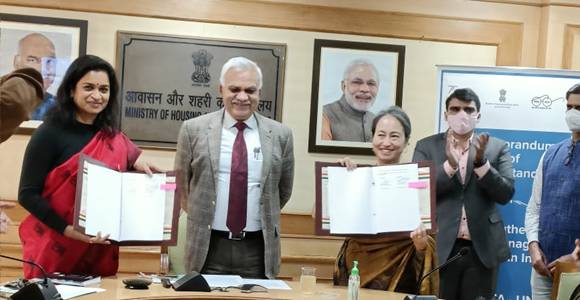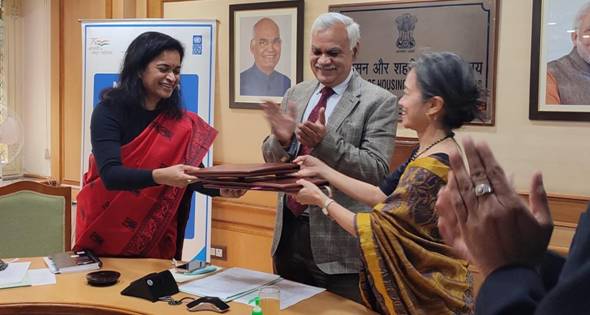Ministry of Housing and Urban Affairs (MoHUA), Government of India today signed a Memorandum of Understanding (MoU) with the United Nations Development Programme (UNDP) India to strengthen the waste management sector in India under the overall ambit of Swachh Bharat Mission- Urban 2.0. The MoU, operational for a period of five years (2021-26) was signed by Ms. Roopa Mishra, Joint Secretary and National Mission Director, Swachh Bharat Mission-Urban (SBM-U) representing MoHUA, and Ms. Shoko Noda, Resident Representative, representing UNDP India, in the presence of Shri Durga Shanker Mishra, Secretary, MoHUA.
Solid waste management has been a key focus of Swachh Bharat Mission-Urban since its launch in 2014. With concerted focus on source segregation and scientific processing of municipal solid waste, the waste processing capacity in India has gone up by nearly 4 times, from 18% in 2014, to 70% on date. The thrust on sustainable solid waste management with particular focus on plastic waste has been further strengthened with the launch of SBM-U 2.0 on 1st October by Hon’ble Prime Minister, with overall vision of creating “Garbage Free Cities”. The MoU signed between MoHUA and UNDP India marks the beginning of a collaborative journey to strengthen collection, segregation, recovery and recycling of all kinds of non-biodegradable waste, and integrated plastic waste management under SBM-U 2.0.
The multi-stakeholder approach followed by SBM-U in the last seven years has played a significant role in the success of the Mission in the last seven years with several sector partners coming together to achieve the collective goal of ‘Swachhata’ in urban India. The philosophy of collaboration and partnerships is a key tenet in the Operational Guidelines of SBM-U 2.0. In keeping with this spirit, the MoU which comes into effect from today, will cover interventions in the areas of capacity building, digital interventions, research and development, monitoring and evaluation, and social and behavior change communication. Through this MoU, UNDP India will also be facilitating setting up of 75 Smart Swachhata Kendras across the country, working with local partners and Urban Local Bodies (ULBs). Moreover, in line with SBM-U 2.0’s core objective of sanitation and waste workers’ welfare, the model will also focus on integrating informal waste pickers – Safai Saathis - and linking them to various government welfare schemes. With digital technologies playing a critical role in driving Mission outcomes of SBM-U 2.0, the MoHUA- UNDP model will also make use of digital enablers such as Artificial Intelligence and Machine Learning to digitize the waste flow and streamline activities in the Swachhata Kendras.
Speaking at the event, Shri Durga Shanker Mishra, Secretary MoHUA said, “Today’s collaboration comes in the backdrop of the 75th year of India’s independence, the Azadi Ka Amrit Mahotsav, with UNDP supporting us with the set up and operationalization of 75 Swachhata Kendras across the country. I take this opportunity to thank UNDP for its long-standing association with MoHUA and invite other technical and knowledge partners at the national, state and city levels to bring in their expertise to aid and assist SBM-U 2.0’s outcomes in solid waste and used water management.”
Elaborating on UNDP’s association with SBM-U 2.0, Ms. Noda said, “UNDP India is proud of its association with SBM-U and has facilitated the processing 82,000 MT of plastic waste since 2018 through its 20+ Swachhata Kendras or Material Recovery Facilities. With today’s MoU, we are committed to working collaboratively with MoHUA to promote, scale-up, and replicate a sustainable model for waste management across cities in line with SBM-U 2.0’s objective of zero waste while also bringing about a marked improvement in the lives of informal waste pickers.”
With the vision of making cities ‘Garbage Free’, SBM-U 2.0 is focused on achieving 100% waste processing along with bio-remediation of legacy dumpsites, construction and demolition waste and plastic waste management. The collaboration between MoHUA and UNDP India is another step towards realizing the vision of ‘Clean Air, Clean Water, Clean Land’ in urban India through a circular economy approach based on the 3R (reduce, reuse, recycle) principle.












